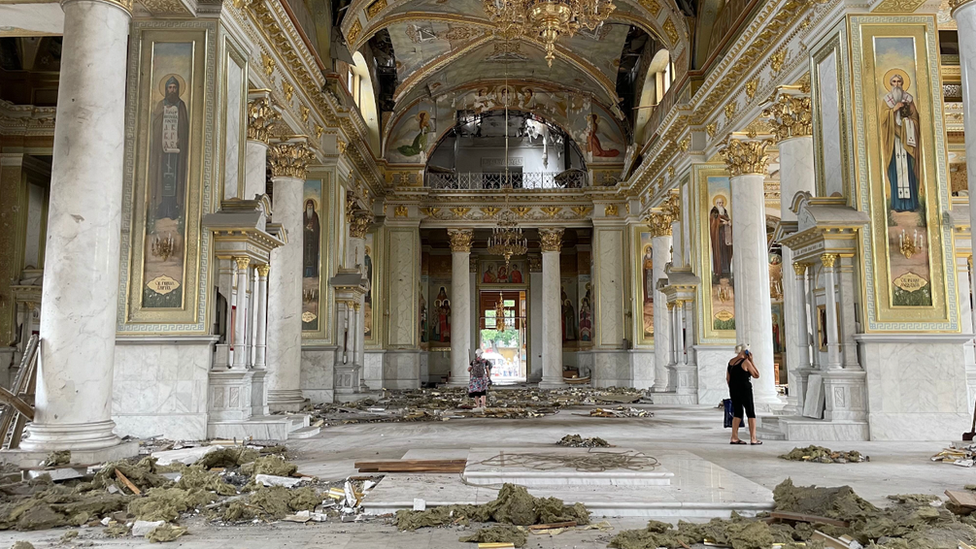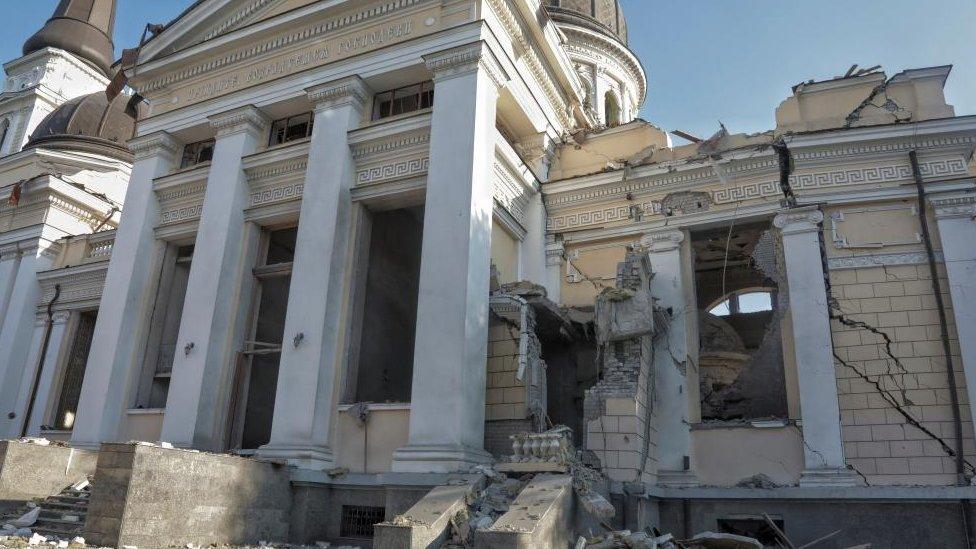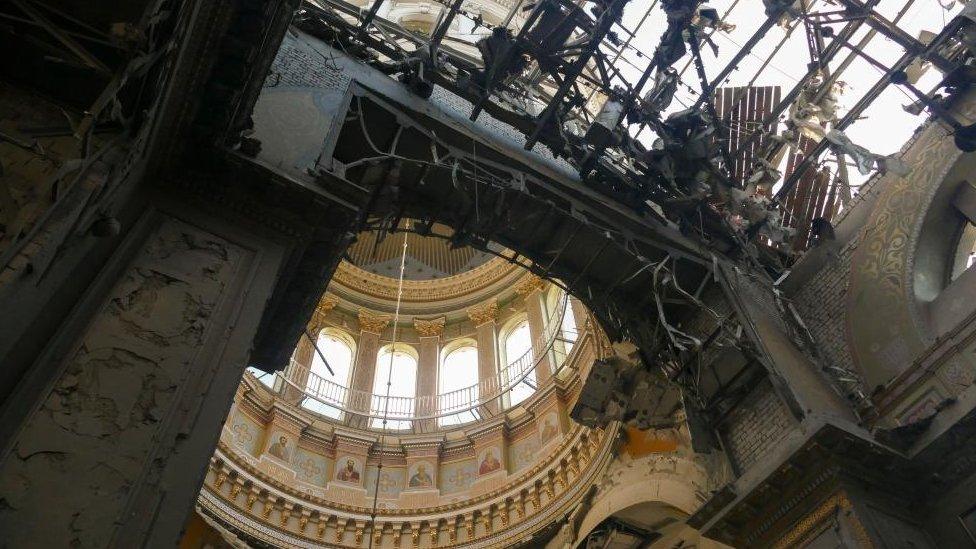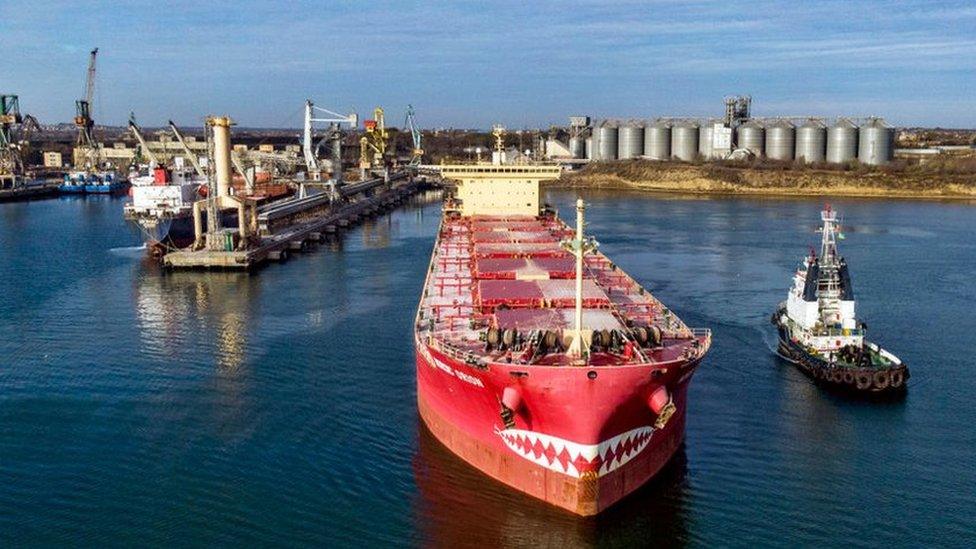Ukraine war: Russian strikes on Odesa damage Orthodox cathedral
- Published
Watch: Phone video shows fire burning inside the historic cathedral after Russian missile strikes
At least one person has been killed and 19 injured in Russian missile strikes on the Ukrainian port city of Odesa, officials have said.
The Transfiguration Cathedral in the Unesco world heritage-listed historic centre was also badly damaged.
Russia claimed its Odesa targets were being used to prepare "terrorist acts" and blamed Sunday's cathedral attack on Ukrainian air defence.
Ukraine's President Volodymyr Zelensky has vowed retaliation.
Moscow has been launching near-constant attacks on Odesa since it withdrew from a landmark grain deal on Monday.
Regional governor Oleh Kiper said 14 people, including four children, were taken to hospital on Sunday after the blasts - that also destroyed six residential buildings. .
Kyiv accused Russia of "destroying" the cathedral as part of a campaign to "systematically" harm the Orthodox Church in the country.
"A war crime that will never be forgotten and forgiven #RussiaIsATerroristState," its foreign ministry tweeted.

The damage is as colossal as the cathedral itself. The cracks along its walls represent the strain Odesa has found itself under after a week of constant attacks from the skies.
There is no doubt this was a direct hit from a missile.
Most of the roof is missing. The building's thick ancient walls are still standing but there are pillars leaning at a worrying angle.
Teams have been ferociously picking up debris since the impact in the small hours of this morning.
They show us fragments of what they say was the Russian missile, which destroyed a place of worship under Moscow's control. A cruel irony which is likely to be unintended.
The building is Odesa's largest Orthodox church and was consecrated in 1809. It was demolished by the Soviet Union in 1939, before being rebuilt in 2003.
Andriy Palchuk, the archdeacon of the cathedral, said he was the first person to arrive at the scene.
"The destruction is enormous; half of the cathedral was left without a roof, and the central piles and foundation were destroyed," he said.
"All the windows and stucco moulding were blown out. There was a fragmentary fire, the part where icons and candles are sold in the church caught fire. It was all on fire, burning."
Unesco, the UN's cultural agency, said it was "deeply dismayed and condemns in the strongest terms" the attack on the historic centre of Odesa.
It has repeatedly urged Russia to cease attacks on Odesa. The city's historic centre was designated an endangered World Heritage by the organisation earlier this year, despite Russian opposition.

But in an update posted to Facebook, Ukraine's southern command said Russia had targeted the Odesa region with at least five different types of missiles.
The head of Ukraine's presidential office, Andriy Yermak, repeated calls for more missiles and defence systems after the latest attack on Odesa.
"This is the undisguised terror of a peaceful city," Mr Yermak wrote on Telegram. "The enemy must be deprived of the opportunity to attack civilians and infrastructure."
Moscow has notably stepped up attacks on the port city since it withdrew from the UN backed grain deal on Monday and Ukraine has accused it of targeting grain supplies and infrastructure vital to the deal.
A strike earlier this week destroyed some 60,000 tonnes of grain, officials said.
Odesa is Ukraine's biggest port, and millions of tonnes of grain have been shipped from its docks under the terms of the deal.
The deal - brokered by Turkey and the UN - between Russia and Ukraine was struck in July 2022, allowing cargo ships to sail along a corridor in the Black Sea.


GEO-GENIUS OR GEOGRAPHICALLY CHALLENGED?: Lose yourself in the deceivingly difficult location guessing test
10 BILLION A DAY: From a simple square grid to a staple of our communication, discover the story of the first emoji

Related topics
- Published2 April 2024

